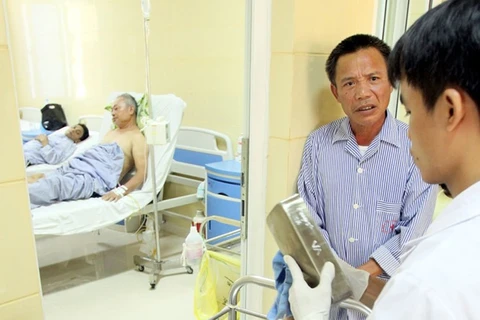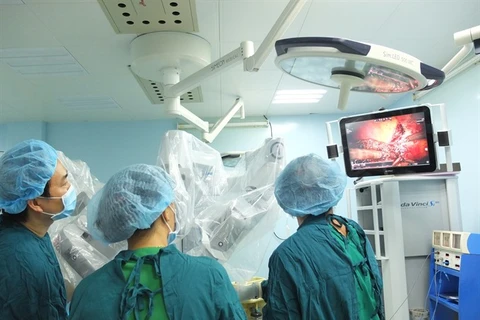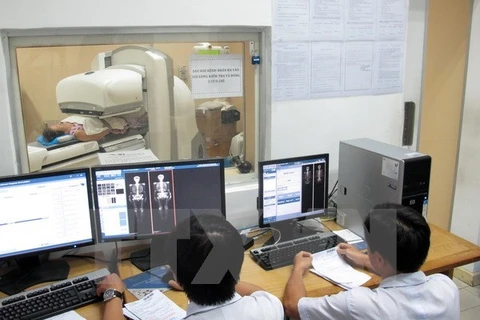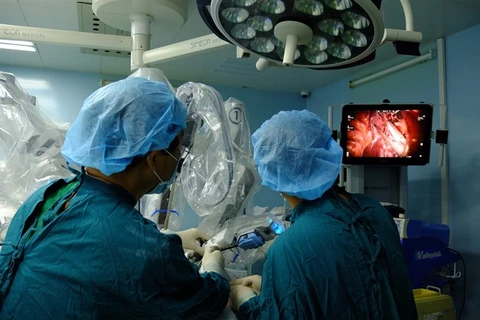 Cancer patients await radiation therapy at the K Hospital branch in Thanh Tri District. (Photo vietnamnet.vn)
Cancer patients await radiation therapy at the K Hospital branch in Thanh Tri District. (Photo vietnamnet.vn) Hanoi (VNA) - The National Cancer Hospital (K Hospital) is working on a project to set up the first centre in the country to use proton radiation therapy to treat cancer.
Health experts say the new therapy is an advanced form of radiation therapy that would reduce treatment time and promises to improve the quality of life during and after treatment.
Current popular cancer treatments include surgery, chemical therapy, radiation therapy and palliative care.
Deputy Health Minister Le Quang Cuong said that proton radiation therapy has been applied in some countries for its ability to treat tumors that can’t be treated by Cobalt radiation or cyclotron radition. The therapy has also proved effective in treating head and neck cancer, prostate cancer and paediatric cancer.
“The rate of patients treated with proton radiation having their tumors decrease in size after three years are considerably positive – 80 to 90 percent with liver cancer and almost 100 percent with prostate cancer,” he said.
K Hospital’s statistics also reveal that survival rate of three more years among patients with first and second stage lung cancer is 86 percent, and of five more years among prostate cancer patients is 99 percent. The survival rate of five more years among head and neck cancer patients is 74 percent.
Proton therapy is an advanced form of radiation therapy that uses a single beam of high-energy protons to treat various forms of cancer with less side effects. The key factor in proton therapy is superior dose distribution, allowing physicians to precisely aim the highest dose at the tumor, avoiding healthy tissues.
Proton therapy is especially appropriate for cancers with limited treatment options and those where conventional x-ray radiotherapy presents an unacceptable risk to the patient, e.g. eye or brain tumors, tumors close to the brain stem or spinal cord.
Proton therapy is also very much indicated for the treatment of pediatric tumors. As a child’s growth implies a constant high rate of mitosis, his cells will be as vulnerable to ionising particles as proliferating cancerous ones.
It is therefore crucial to aim the beams only at the tumor to avoid damage like growth abnormalities, cognitive impairments, radiation-induced tumors, cardiac damage, and other complications later in life.
Tran Van Thuan, Director of K Hospital, said that a treatment session in proton therapy generally takes 10 minutes, much less than the time need for other therapies applied in Vietnam currrently.
“This would also address the current overloading situation in cancer hospitals in Vietnam and give more cancer patients the chance to live,” Thuan said.
Thuan said K hospital’s branches have been overloaded constantly in recent years.
In 2015, the hospital treated 11,700 patients, in 2016 the number was 12,000 and, so far this year, 15,000 patients up to this time of 2017.
At the K hospital’s branch in Thanh Tri district, there are three cyclotron radiation machines. Thuan said each machine can be used up to 23 hour a day for 150 to 200 patients per day.
“Meanwhile, it is recommended that each machine is only used for 40 patients per day,” he said.
The overcrowding means the hospitals have to work extra hours to serve the patients: a day would only end at 3 or 4 o’clock in the morning of the next day, which would begin just an hour later.
Three or four more new radiation machines are set to go operational in hospital only in April. Each cyclotron radiation machine costs 50 – 100 billion VND (2.2 – 4.4 million USD) on average.
Vietnam sees 126,000 new cases of cancer each year, and the number of cancer deaths each year is 94,000.
Last year, the World Health Organisation continued to rank Vietnam among the countries with the highest rate of cancer fatalities. Vietnam was ranked 78th among 172 countries with a cancer death rate of 110 for every 100,000 people, along with Finland, Somalia and Turkmenistan.-VNA
VNA

























